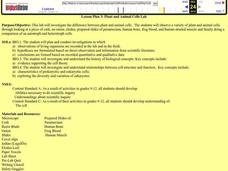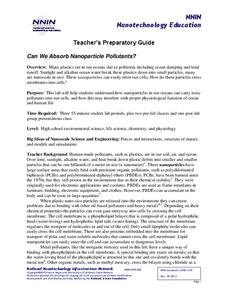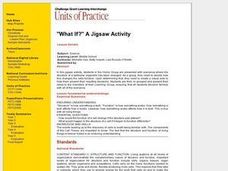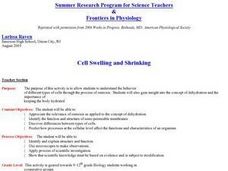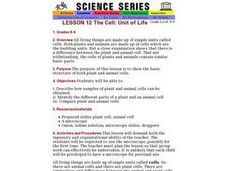Curated OER
Cells are 3-D!
Pupils design three dimensional models of plant and animal cells. They identify the cells parts, and compare animal and plant cells.
Curated OER
Cell Cookie Lesson Plan
Students review the structure and fuctions of plant and animal cells. They use various types of materials such as sugar cookies and cake frosting for this activity.
Curated OER
MAKING THREE DIMENSIONAL PLANT AND ANIMAL CELLS
Students create two different cells, one plant and one animal. In this plant and animal cell lesson students form groups and construct a part of a cell. Students then put them all together to form one plant or animal cell.
Curated OER
How Cells Duplicate and Why Where Something Can Go Wrong
Seventh graders explore the function of a cell and cell division. In this investigative lesson students construct a 3-D model of a DNA molecule.
Curated OER
Cells - Building Blocks of Life
In this cells worksheet, students review cell organelles and their functions plus the different processes that take place within cells. This worksheet has 9 matching and 5 true or false questions.
Curated OER
How Many Cells Are Born in a Day?
Students predict the number of cells after a series of cell divisions. In this cells lesson students create a graph of their results and create a patterned drawing.
Curated OER
Plant and Animal Cells
Students investigate the difference between plant and animal cells. They observe a variety o plant and animals cells by looking at a piece of cork, an onion, elodea, prepared slides of paramecium, human bone, frog blood, and human...
Curated OER
Quiz on Cell Theory
In this cell theory quiz worksheet, students complete an on-line game, clicking on questions and matching answer cards and scoring 1 point per correct answer. Printable version available also.
Curated OER
Cell Organelles #3-Quiz
In this cell organelles quiz worksheet, students complete an on-line game, clicking on questions and matching answer cards and scoring 1 point per correct answer. Printable version available also.
Curated OER
Notes on Cell Organelles
Students record information and write journal entries on the structure and function of cell organelles while viewing a Powerpoint presentation.
National Institute of Open Schooling
Solid State
Crystal comes from a Greek word meaning ice. Activity eight in a series of 36 has class members analyzing amorphous and crystalline solids and further classifying them based on their forces. They then explore solids, learning about unit...
Howard Hughes Medical Institute
Winogradsky Columns: Microbial Ecology in the Classroom
Winogradsky columns are ideal for observing the role of bacteria and other microorganisms in an ecosystem. This student activity guide is complete with data tables for observations and analysis questions for processing what was observed....
National Nanotechnology Infrastructure Network
Can We Absorb Nanoparticle Pollutants?
Just because we can't see it doesn't mean it isn't there! A growing concern for environmental scientists is toxic nanoparticles in our air and water. Young scholars conduct an experiment to demonstrate how these particles can cross our...
Teach Engineering
Android Acceleration
Prepare to accelerate your Android. Pupils prep for the upcoming activity in this third installment of a four-part series. The lesson progresses nicely by first introducing different types of acceleration to the class. The teacher...
Curated OER
"What If?" A Jigsaw Activity
Middle schoolers, in groups, consider a scenario in which some structure of a cell has been changed. They explore how structural change affects the function of a cell and create a visual aid to illustrate their observations.
Curated OER
Cell Me What?
Young scholars compare and contrast the characteristics of robots and cells. For this biology lesson, students examine the parts and function of cell organelles. They create a visual representation of their cell/robot analogy.
Curated OER
Cell Types
Fourth graders create cartoon characters which compare and contrast two types of cells: nerve and muscle. Cartoon characters show how these two cells are similar, how they are different, and the relationship between the two cell types.
Curated OER
Cell Swelling and Shrinking
Students examine the concept of osmosis in relation to dehydration. They identify the function and structure of semi-permable membranes. They predict how certain processes can affect the characteristics of an organism.
Curated OER
The Cell: Unit of Life
Students identify the parts of plant and animal cells, how samples can be obtained and what the differences are.
Curated OER
Defining the Difference Between Prokaryotic and Eukaryotic Cells
Students examine microscopic life by conducting a scientific investigation. In this cell analysis lesson, students define the prokaryotic and eukaryotic cells and discuss their word origins. Students view each type of cell on slides...
Curated OER
A Hands-On Paper Activity Examining The Relationship Between Hierarchical Levels Of Structure And Function
Students investigate how complex functions arise in biological systems through the creation of several paper structures to accomplish various tasks such as remaining suspended in air for the longest time, making the loudest noise and...
Curated OER
Cell Growth and Division
Students explore the cell cycle. They examine why the cell cycle is necessary. Students discuss the processes of interphase and mitosis. They explore the general phases of mitosis; prophase, metaphase, anaphase and telophase.
Curated OER
Cell Cycle Movie
Fourth graders draw on previous knowledge and create hand-held flip books that show a cell going through the motions of the cell cycle. They create a flip book, which illustrates the cell cycle.








